|
|
|
Sort Order |
|
|
|
Items / Page
|
|
|
|
|
|
|
| Srl | Item |
| 1 |
ID:
067372
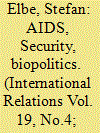

|
|
|
| 2 |
ID:
118417
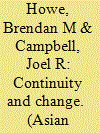

|
|
|
|
|
| Publication |
2013.
|
| Summary/Abstract |
In this article, we address four common, often contradictory misconceptions concerning Japanese foreign and security policy. First, Japan's strategic "normalization" is dangerous. Second, Japan is incapable of having a "normal" policy. Third, Japan is about to become "normal." Fourth, foreign and security policy under the Democratic Party of Japan (DPJ) will differ radically from what it was for fifty years under the Liberal Democratic Party (LDP). We contend that Japan is not a threat; that it has a security policy, but not one that fits well with Western models; and that Japan's security policy is changing, gradually not radically, and is not becoming just like the West's.
|
|
|
|
|
|
|
|
|
|
|
|
|
|
|
|
| 3 |
ID:
126940
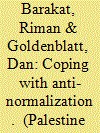

|
|
|
|
|
| Publication |
2012.
|
| Summary/Abstract |
The issue of anti-normalization has been attracting the attention of a growing number of Palestine activists. In recent months, several joint Israeli and Palestine activities have been targeted and disrupted by “anti-normalization” protesters. The issue has provoked concern among Israeli NGOs and international donors alike- the former being involved in a range of joint Israel-Palestine activities, and the latter funding those activities. The positions of Palestine NGOs are mixed. While some groups engage with Israelis in a tacit and low-profile manner, others have ended their involvement in joint activities altogether, regardless of the nature and purpose of the joint effort. Other Palestinian activists welcome joint nonviolent resistance to the occupation as in the cases of the solidarity campaigns in Sheikh Jarrah, Budrus, Ni'Lin, Bil'in, Nabi Saleh, Kufer Qadem and more. It should be also noted that there is a general exhaustion on the Palestine side, which has nothing to do with attitudes toward Israeli-Palestine dialogue and joint activity. The general sentiment among Palestine is that they should direct their energy toward developing Palestine institution and society and achieve a certain level of equality on all level before engaging with Israelis.
|
|
|
|
|
|
|
|
|
|
|
|
|
|
|
|
| 4 |
ID:
166898
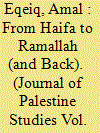

|
|
|
|
|
| Summary/Abstract |
This article explores border crossing and the Palestinian city as a literary metropolis—two major themes in the works of emerging Palestinian novelists in Israel. It looks at the “re-Palestinization” of urban space by writers who belong to a post-Oslo generation of Palestinian intellectuals that left villages and small towns in Israel to go and study, work, and live in the city. What distinguishes the literature of this generation is its negotiation of border crossing in a fragmented geography and its engagement with the city as a space of paradoxical encounter between a national imaginary and a settler-colonial reality. Based on a critical reading of their works, the article argues that Adania Shibli and Ibtisam Azem challenge colonial border discourse, exposing the ongoing Zionist erasure of the Palestinian city and creating a new topography for Palestinian literature. The article also traces the role of these writers in the “twinning” of Haifa and Ramallah starting in the late 1990s, and it examines how this literary and cultural “sisterhood” informs spatial resistance.
|
|
|
|
|
|
|
|
|
|
|
|
|
|
|
|
| 5 |
ID:
132306
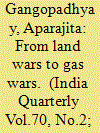

|
|
|
|
|
| Publication |
2014.
|
| Summary/Abstract |
Chile and Bolivia have been intertwined in a complex relationship of hostility and cooperation for over a century. Since the Bolivian defeat in the War of the Pacific and the Treaty of Peace and Friendship of 1904, issues of resource sharing and Bolivia's sovereign access to sea on the Pacific side have altered the dynamics of such a relationship. Indeed, they appear to be the major stumbling blocs to attempts at normalisation of relations between the two Andean neighbours. In the recent years, Chile-Bolivia relations have been strained over the issue of gas. Bolivia's political volatility over gas and Chile's refusal to discuss the issue of access to the sea were viewed as being part of the same quagmire of relations. However, despite disparities in development between the two countries, globalisation has altered the context of mutual engagement. Against this backdrop, the article specifically looks at one such contemporary issue of bilateral contestation, that is, the gas issue. The article will examine its geo-economic significance in the larger context of regional cooperation and energy security. It intends to probe the plausibility of the argument that the gas issue has the promise and potential to lighten the sedimented antagonism between the two.
|
|
|
|
|
|
|
|
|
|
|
|
|
|
|
|
| 6 |
ID:
189181


|
|
|
|
|
| Summary/Abstract |
IT SOMETIMES happens that history itself evaluates what a specific individual has done. A case in point is Igor Rogachev, a renowned Soviet and Russian diplomat who played a tremendous role in bolstering our country's positions in the Asia-Pacific region (APAC) and in reforming the former Soviet Union's, and subsequently Russia's, relations with China, where he served as the ambassador of the Russian Federation for 13 years.
|
|
|
|
|
|
|
|
|
|
|
|
|
|
|
|
| 7 |
ID:
078646
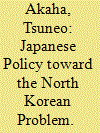

|
|
|
|
|
| Publication |
2007.
|
| Summary/Abstract |
North Korea became an urgent problem for Japan as a result of the 1994 nuclear crisis in North Korea, the 1998 missile launch over Japan and the 2003-4 nuclear crisis. At the historic Tokyo-Pyongyang summit in September 2002, both sides acknowledged the need to solve the security issues surrounding the Korean Peninsula through peaceful, multilateral efforts. However, the issue of North Korean abduction of Japanese citizens in earlier decades intensified Japanese sentiment against the North and this issue halted bilateral normalization talks. Japan has participated in six-party talks on the nuclear issue since 2004, but its distinct bilateral interests vis-à-vis North Korea, South Korea and the United States limit its influence in the multiparty engagement.
|
|
|
|
|
|
|
|
|
|
|
|
|
|
|
|
| 8 |
ID:
159535
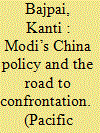

|
|
|
|
|
| Summary/Abstract |
The Doklam confrontation between India and China in the summer of 2017 was symbolic of the brewing tensions in their relationship. While the confrontation was resolved peacefully, its roots go back at least to 2007. Both the Manmohan Singh government and the Narendra Modi government pushed back against what they perceived to be a series of moves on bilateral, regional, and international issues that went against Indian interests. Modi’s responses have been more aggressive than Manmohan Singh’s in two ways. First, under Modi, India has more openly than ever before attempted to construct a coalition of militarily powerful states in the Asia-Pacific to increase Delhi’s bargaining power with Beijing. Second, India has sought to change the terms of engagement on the border conflict in three respects: a return to clarification of the Line of Actual Control (LAC) as the first step in border negotiations; linking further normalization between the two countries to progress towards a final border settlement; and seeking to inject a greater sense of urgency in the search for a settlement. This article concludes by asking why Modi responded more aggressively to China. It presents four explanations and concludes that Modi’s election in May 2014 coincided with a growing sense of strategic exasperation in India over its China policy, which questioned the value of the post-1988 commitment to normalization. The paper suggests that Modi shared that sense of exasperation, hence the rapid change in India’s stance within months of his coming to power.
|
|
|
|
|
|
|
|
|
|
|
|
|
|
|
|
| 9 |
ID:
193009
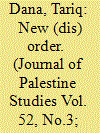

|
|
|
|
|
| Summary/Abstract |
The normalization of relations between the United Arab Emirates (UAE) and Israel under the Abraham Accords is part of a long-standing security cooperation between the two regimes to monopolize regional power. Indeed, with the rapidly changing political and security landscape in the Arab world, the Abraham Accords have become central to understanding alliance formation in the region. The Accords have significantly enhanced the already existing security and military relations between Israel and the UAE, with heavy Emirati investment in advanced Israeli weapons systems and security technologies, military and intelligence sharing, as well as economic partnerships in strategic sectors. While the alliance is often portrayed as a defensive security arrangement aimed at countering the “Iranian threat,” a closer examination reveals that it is much more than that. Sponsored by the United States, the alliance entrenches Israeli settler colonialism and Arab authoritarianism as mutually inclusive pillars for the region, with the ultimate objective of reproducing US hegemony in the face of changing global dynamics.
|
|
|
|
|
|
|
|
|
|
|
|
|
|
|
|
| 10 |
ID:
118133
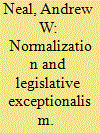

|
|
|
|
|
| Publication |
2012.
|
| Summary/Abstract |
This article analyzes counterterrorist lawmaking as an instance of security politics. It does so through archival parliamentary analysis of British counterterrorism legislation at three different times: in the wake of a perceived security emergency (2001); when the impact of an emergency is fading (2008); and when there is no emergency (2000). The findings show that over time, legislative exceptions and emergencies become normalized. By taking a parliamentary, legislative, and historical perspective, the article also challenges some of the assumptions of the exceptionalism debate.
|
|
|
|
|
|
|
|
|
|
|
|
|
|
|
|
| 11 |
ID:
080008
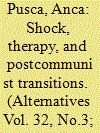

|
|
|
|
|
| Publication |
2007.
|
| Summary/Abstract |
This article explores how the concept of shock has been used in connection to processes of social change and transition, and argues that a wider exploration of the concept in fields other than political science and international relations can provide us with important insights into the individual and collective impacts of transitions. Although criticizing the idea of shock as therapy, the article presents a number of alternative uses of shock that can be particularly insightful for understanding often contradictory behaviors that characterize periods of transition, as well as a series of dangerous consequences of attempts to deal with shock through various techniques of distancing, distraction, and normalization
|
|
|
|
|
|
|
|
|
|
|
|
|
|
|
|
| 12 |
ID:
182591
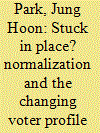

|
|
|
|
|
| Summary/Abstract |
Using the case of the Indonesian Prosperous Justice Party (PKS), I seek to measure the actual impact of Islamist parties’ moderation on their electoral performances and voter bases. Statistical analyses find that although PKS has experienced an influx of diverse voters since the early 2000s, the influx was offset by a gradual withdrawal of educated Islamist voters, who had been loyal to the party since its establishment. I further claim that this change in PKS's voter profile was attributable not to moderation per se but to normalization, manifesting in an adaptation of the party elites’ behaviors to the existing patterns in Indonesian politics. The party's recent policy shift with a conservative tone was insufficient to regain votes from its original supporters, who already saw PKS as a run-of-the-mill party. PKS's case implies that it is necessary for Islamist parties to maintain their distinctiveness as an alternative voice in the party system.
|
|
|
|
|
|
|
|
|
|
|
|
|
|
|
|
| 13 |
ID:
044126
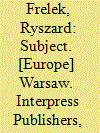

|
|
|
|
|
| Publication |
Warsaw, Interpress Publishers, 1971.
|
| Description |
212p.Pbk
|
|
|
|
|
|
|
|
|
|
|
|
Copies: C:1/I:0,R:0,Q:0
Circulation
| Accession# | Call# | Current Location | Status | Policy | Location |
| 007614 | 940.55/FRE 007614 | Main | On Shelf | General | |
|
|
|
|
| 14 |
ID:
140654
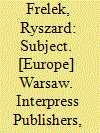

|
|
|
|
|
| Publication |
Warsaw, Interpress Publishers, 1971.
|
| Description |
211p.pbk
|
|
|
|
|
|
|
|
|
|
|
|
Copies: C:1/I:0,R:0,Q:0
Circulation
| Accession# | Call# | Current Location | Status | Policy | Location |
| 009283 | 940.55/FRE 009283 | Main | On Shelf | General | |
|
|
|
|
| 15 |
ID:
107606


|
|
|
|
|
| Publication |
2011.
|
| Summary/Abstract |
The paradigmatic case in which an almost permanent impasse exists in coming to terms with a difficult war past and 'normalizing' its international relations is that of Japan. Although successive Japanese governments have apologized over the last few decades, these have been countered by periodic episodes within Japan revolving largely around history textbooks, the remembrance of war dead and the quest by nationalists to restore national pride in the past. Regional relations were especially strained during the premiership of Koizumi Juni'chirô and his immediate successor, Abe Shinzô. They improved under Fukuda Yasuo, a moderate on war memory issues, and remained steady under Asô Tarô. Japan's latest prime minister, Hatoyama Yukio, appears determined to address Japan's war past more openly and critically than previous LDP figures, no doubt with an eye to improving Japan's relations with its Asian neighbours. But whatever line he pursues, contestation over war memories will remain an issue. They are driven by deep divisions within Japan at the same time that political leaders seek a more prominent identity for Japan as a 'normal' actor in international affairs. This article analyses key aspects of the politics of Japan's war memories, using insights from collective memory studies and constructivist IR theory. We suggest that the quest for 'normality' has generated a set of tensions and contradictions over the issue of war memories, both domestically and internationally, for which there is no resolution in sight.
|
|
|
|
|
|
|
|
|
|
|
|
|
|
|
|
|
|
|
|
|